
Fears of ‘invisible hands’ as figures show slump in Hong Kong’s cooperation on transfer of foreign fugitives
Critics say a lack of legal cooperation with other jurisdictions has been laid bare by recent high-profile cases involving those fleeing justice, and some experts believe a lax approach and opaque procedures are there for a reason
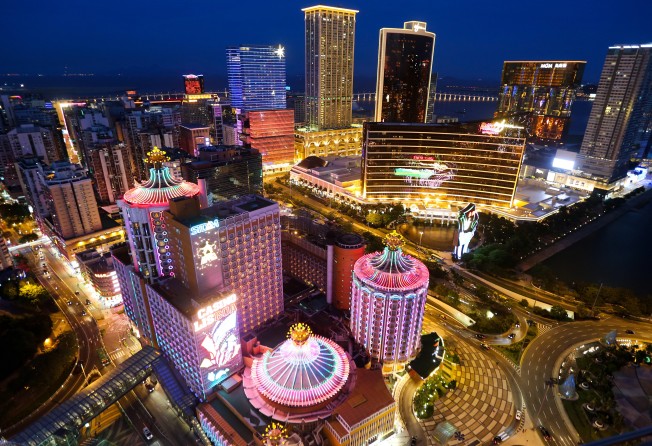
In terms of attracting eyeballs, it was pure news gold.
Police in the city of Jinhua in Zhejiang province had snared a fugitive from a concert crowd of 50,000, thanks to the wonders of facial recognition technology and artificial intelligence. The snatch job had been carried out at a show by Jacky Cheung Hok-yau, one of the “Four Heavenly Kings” of Hong Kong’s music scene.
The arrest was one of a number in May and June at Cheung’s concerts across the country, and saw social media users dub the singer the “fugitive catcher”.
But the fate awaiting these suspects would be very different had they managed to make their way inside the borders of the country’s two special administrative regions, which are separate jurisdictions. Though their legal systems are much admired, recent events and trends in Hong Kong and Macau surrounding the discovery, capture and return of those on the run have highlighted what appears to be a veil being draped over due process in the handling of foreign criminals.

In the case of Hong Kong particularly, questions have arisen about the workings and number of bilateral agreements with other jurisdictions on the surrender of fugitives and matters of mutual legal assistance.
The number of fugitives from justice either surrendered to or by Hong Kong under international treaties has slumped significantly over the two decades since the city returned to Chinese sovereignty, the Post has found.
Also on the decline since 1997 is the rate and number of agreements that Hong Kong has signed with overseas jurisdictions to formalise international cooperation in the fight against crime. The discoveries are based on publicly available data, as justice officials have refused to disclose full figures despite several requests.
Between 1997 and 2002, 31 fugitives were caught in the city and returned to the country seeking them, according to official data. Over the same period, 12 fugitives from Hong Kong justice were returned after being caught in foreign jurisdictions.
However, over the nine-year period between 2008 and last year, the equivalent figures were 23 and 11 – a definitive drop.
Also revealed – using fresh official statistics and publicly available historical data – was that from 1997 to 2002, Hong Kong signed deals on fugitive surrender and mutual legal assistance with 19 foreign jurisdictions. But over the 15-year period between 2002 and 2017, only 29 deals were inked, the last being with the Czech Republic in February 2015.
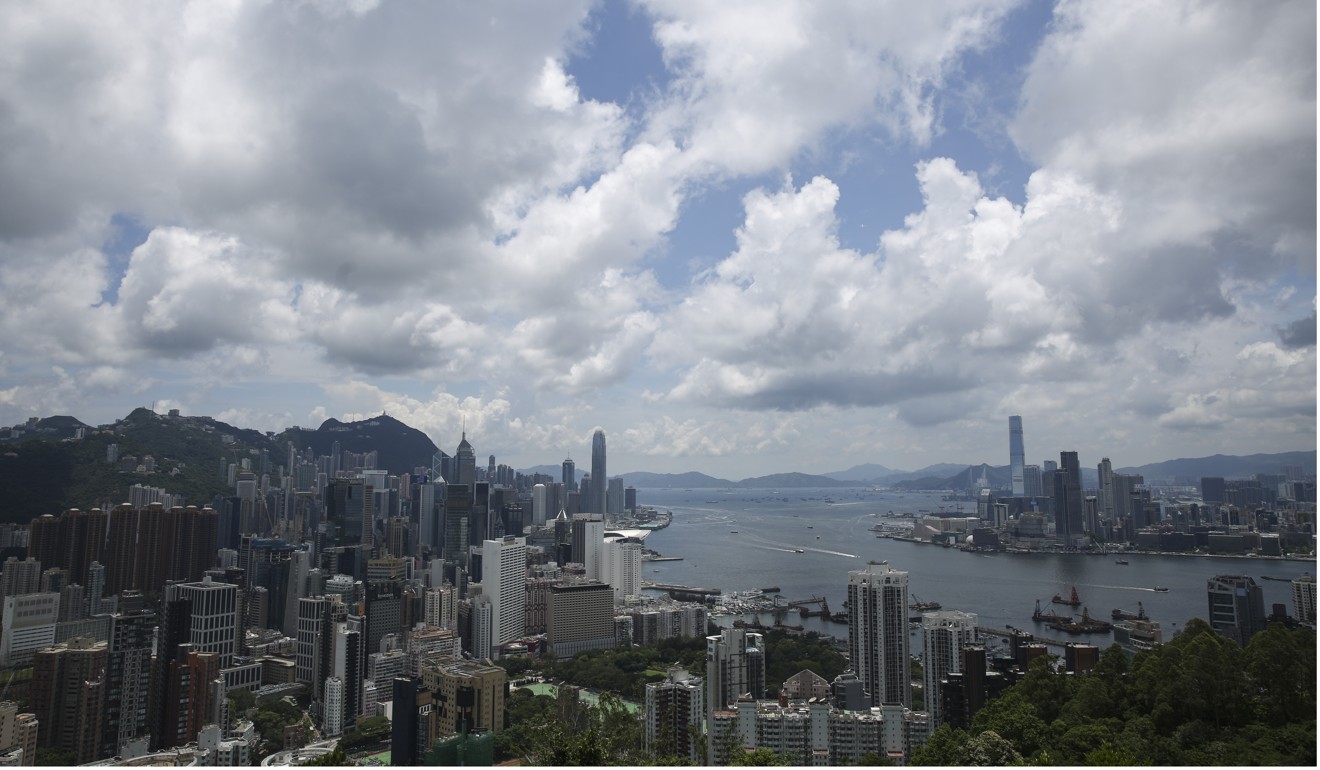
The Department of Justice did not explain specifically the reasons for the drop in figures.
But this comes amid concerns that both Hong Kong and Macau are relying more heavily on opaque and informal “arrangements” when dealing with the pursuit of fugitives and administration of international justice.
The slowdown in cooperation has raised concerns that both cities could become de facto “holding centres” for international and mainland fugitives, as Beijing tries to chart a course through the murky waters of global corruption, crime and money laundering without endangering its national interests.
Professor Fu Hualing, from the law faculty at the University of Hong Kong, said: “The story you are telling is significant. This information is quite exciting and certainly new. We are not sending that many [fugitives] out and people are not sending [fugitives] back either. The big question is, why the decline?”
Fu said this trend partly reflected Beijing’s “very informal” practice in such matters and highlighted the issue of “invisible hands”.
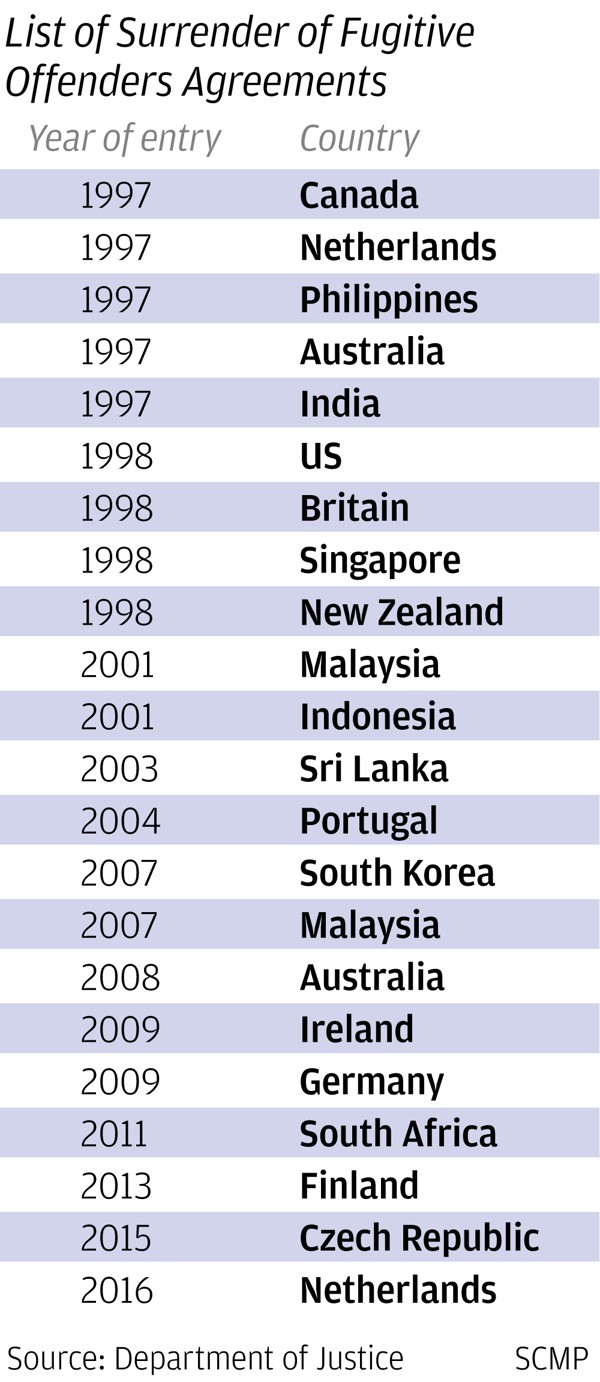
“It is difficult to know for sure because of the opaque nature of these things. China relies on informality and forms of persuasion, and the question is, is this having an impact on the SAR?” Fu said.
“On the face of it – notwithstanding that we do not have all the information – it would appear that there has been an effect, and this should serve as an alert to Hong Kong society and its legal community.”
Lingering murkiness and concern characterised the much publicised 2015 case of five Hong Kong booksellers who went missing and later surfaced on the mainland. They had published books specialising in salacious gossip about state leaders.
The equally mysterious spiriting across the border of billionaire mainland businessman and power broker Xiao Jianhua from his luxury Hong Kong hotel early last year aroused similar concern.
Another equally opaque case involved Hong Iat, a fugitive computer hacker wanted by the United States. Claims by the US government that Hong Kong had surrendered Hong – a Macau resident – to mainland authorities last year on the orders of Beijing forced Chief Executive Carrie Lam Cheng Yuet-ngor to deny that the city had ever handed a fugitive to the mainland.
Many problems surrounding the vague or malleable procedures on extradition lie in an unprecedented act of compromise by China when it regained sovereignty over Hong Kong and Macau in 1997 and 1999 respectively.
Agreements struck with former colonial powers Britain and Portugal gave Beijing control over all defence and foreign affairs matters, but allowed, chiefly in Hong Kong’s case, for the cities to continue making deals and agreements with foreign governments. However, Beijing has the final say.
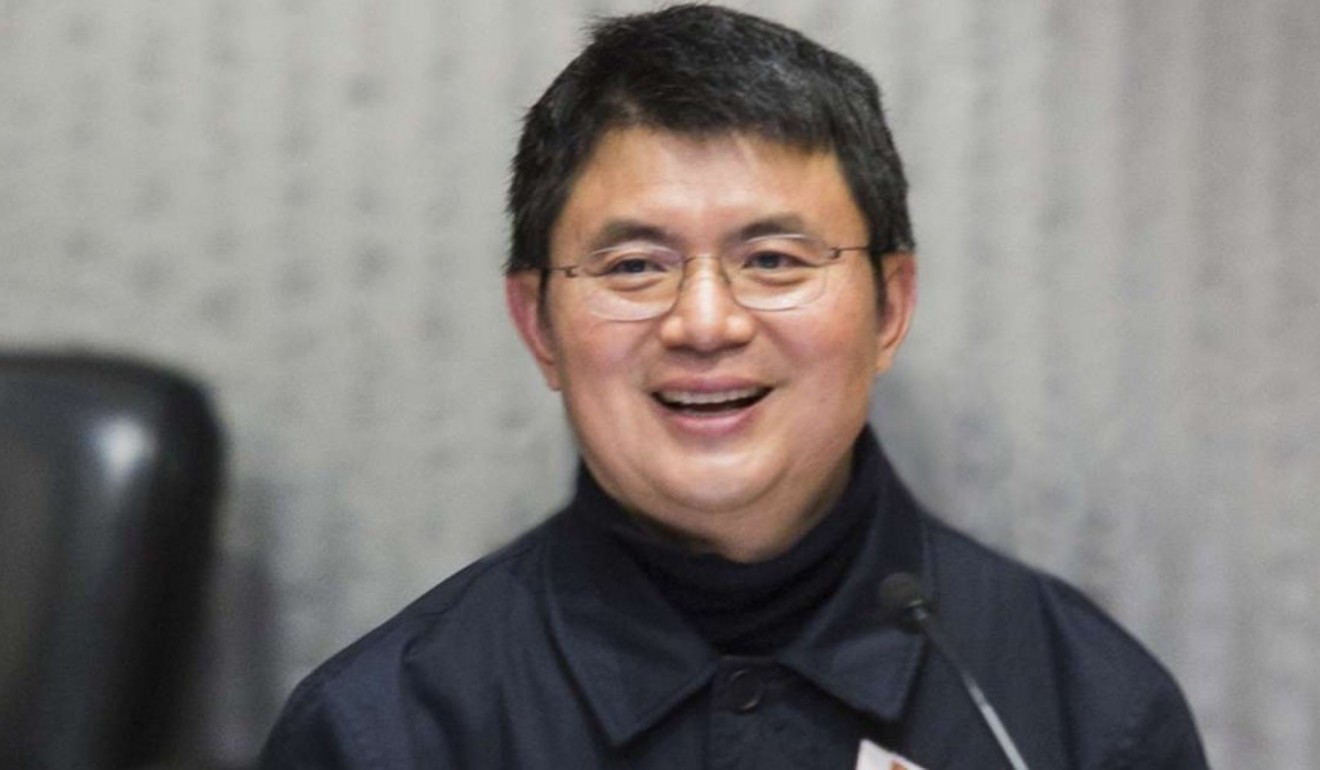
Hong Kong’s Department of Justice declined to fully disclose the precise number of fugitives surrendered by or to Hong Kong since 1997. It only provided total numbers from 2008 onwards. Those figures tell only half the story. Making the information public would be inappropriate, the department said.
“So far, Hong Kong has signed surrender of fugitive offenders agreements with 20 jurisdictions, and mutual legal assistance agreements (MLA) with 32 jurisdictions,” a spokesman said.
In the past 10 years, the city has made 24 requests to other jurisdictions and received 66. Some 2,475 MLA requests have come from overseas, and 153 MLA requests have been made.
Mutual legal assistance agreements can cover anything from the simple gathering of evidence in Hong Kong to an actual surrender of a wanted person.
But none of those formal agreements relates to Macau, and attempts to reach a deal with the casino hub have failed. Macau has MLA agreements with several countries, but none allows for the surrender of fugitives.
According to legal experts and law enforcement insiders, the “opaque” role both Hong Kong and Macau provide for Beijing comes into its own at a time of heightened tensions with the US over trade and a host of strategic military and political issues.
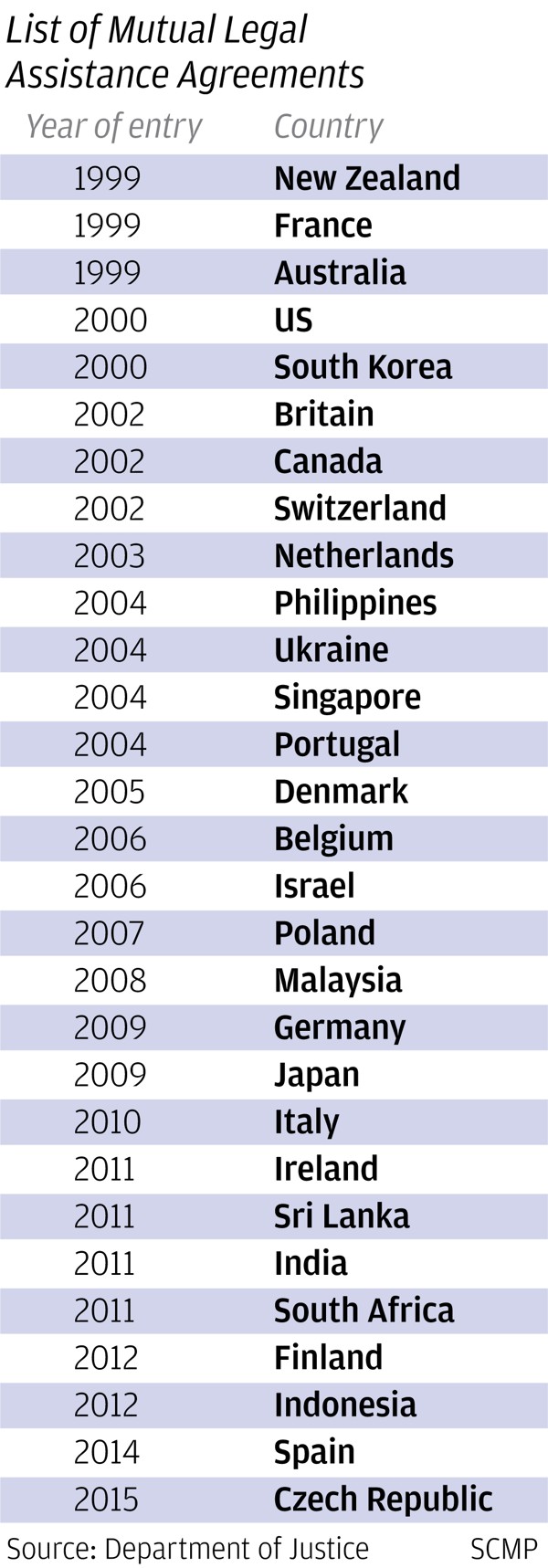
Professor Simon Young, an associate dean in research at HKU’s law faculty, said: “With the absence of formal arrangements on criminal matters – especially at a time of such global uncertainty and change when I think we can see China keen to exert control over its nationals and on anything which might compromise their wider strategic interests – the two SARs give China a ‘grey’ area in which to operate.”
Macau lawyer Jorge Menezes said: “Politically motivated crimes are an obvious matter of concern when one discusses surrendering ‘fugitive offenders’. Mutual legal assistance agreements have implicit in them an idea of global standards that may not easily apply to nationalistic approaches to criminal repression.”
According to a 30-year barrister of Hong Kong criminal law, who requested anonymity, this political dimension to the legal procedures was inescapable.
“Hong Kong has a good reputation for surrendering persons, except those that Beijing has an interest in not being surrendered. In every fugitive offender’s case, the central authorities have the final say,” he said.
But he believed a formal surrender arrangement between Hong Kong and the mainland was not politically feasible.
“People have no trust in the mainland legal system,” he said.
“However, there are ‘irregular’ surrender mechanisms in place whereby mainland authorities can bring someone of interest from Hong Kong to the mainland. I know from a reliable source in the Hong Kong police force that there are many cases of this kind.”
He believed there was a good reason Macau did not have fugitive arrangements.
“It provides a ‘safe haven’ for absconding Chinese who have Beijing’s approval. And if the mainland wanted a person who had absconded to Macau, then they have the means.”
As a self-proclaimed “international city”, Hong Kong should have a broad network of arrangements in place with other jurisdictions, the barrister added, but instead the city was used by global fraudsters and money launderers.
“Considering that it has been over 20 years since the handover, Hong Kong does not have that many arrangements. Yet it says it is an international city.”